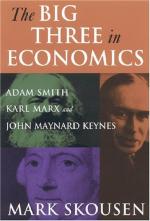|
This section contains 1,741 words (approx. 6 pages at 300 words per page) |

|
The English economist John Maynard Keynes, the son of a distinguished Cambridge logician and economist, was one of the most brilliant and influential men of the twentieth century. His role as the architect and chief negotiator of Britain's external economic policies in two world wars was only one side of his public life. During his own lifetime, his economic views, contained primarily in two great works, A Treatise on Money (London, 1930) and The General Theory of Employment, Interest and Money (London, 1936), revolutionized the economic practice, and to a lesser extent, the economic theory, of Western governments.
Keynes wrote only one philosophical work, A Treatise on Probability (London, 1921), but it is a philosophical classic. The following account of the book's leading ideas adheres to its own main divisions.
Philosophy of Probability
Keynes's philosophy of probability is contained chiefly in Parts I and II...
|
This section contains 1,741 words (approx. 6 pages at 300 words per page) |

|


